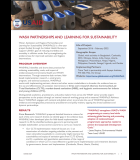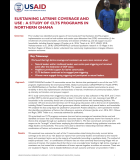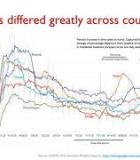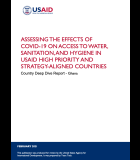Sustainable Fisheries Management Project (SFMP)
The objective of this five-year project (October 2014-October 2019) is to rebuild marine fisheries stocks and catches through adoption of responsible fishing practices. The project contributes to the Government of Ghana’s fisheries development objectives and USAID’s Feed the Future Initiative.
Working closely with the Ministry of Fisheries and Aquaculture Development and the Fisheries Commission, USAID/Ghana SFMP aims to end overfishing of key stocks important to local food security through a multipronged approach:
- Iimproved legal enabling conditions for co-management, use rights and effort-reduction strategies
- Strengthened information systems and science-informed decision-making
- Increased constituencies that provide the political and public support needed to rebuild fish stocks
- Implementation of applied management initiatives for several targeted fisheries ecosystems More than 100,000 men and women involved in the local fishing industry will benefit from this project.
Activity Description
In this follow-on, the USAID /Ghana SFMP focuses efforts on the small pelagics fisheries along the entire coastline as well as the demersal fisheries and essential mangrove fish habitat in the Western Region. The project will promote ecosystem-based and adaptive management approaches. Additionally, improvements in the value chain of smoked fish, important to tens of thousands of women fish processors and marketers will be supported. The project also implements activities aimed at reducing child labor and trafficking in the fisheries sector in the Central Region of Ghana.
Expected Outcomes
The Project aims to:
- Create four fisheries management plans developed and/or adopted and implemented at different ecosystem scales (national small pelagics plan, Western Region Demersal Plan, Community based plans for the Pra and Ankobra estuarine/mangrove systems).
- Approximately 13,000 people, a majority women, benefiting from diversified livelihoods, access to micro-credit, adoption of more profitable fish smokers and product value additions.
- Several fishing communities more resilient to climate impacts
- Capacity of more than a dozen district authorities to promote and support resilient community policies and initiatives.






